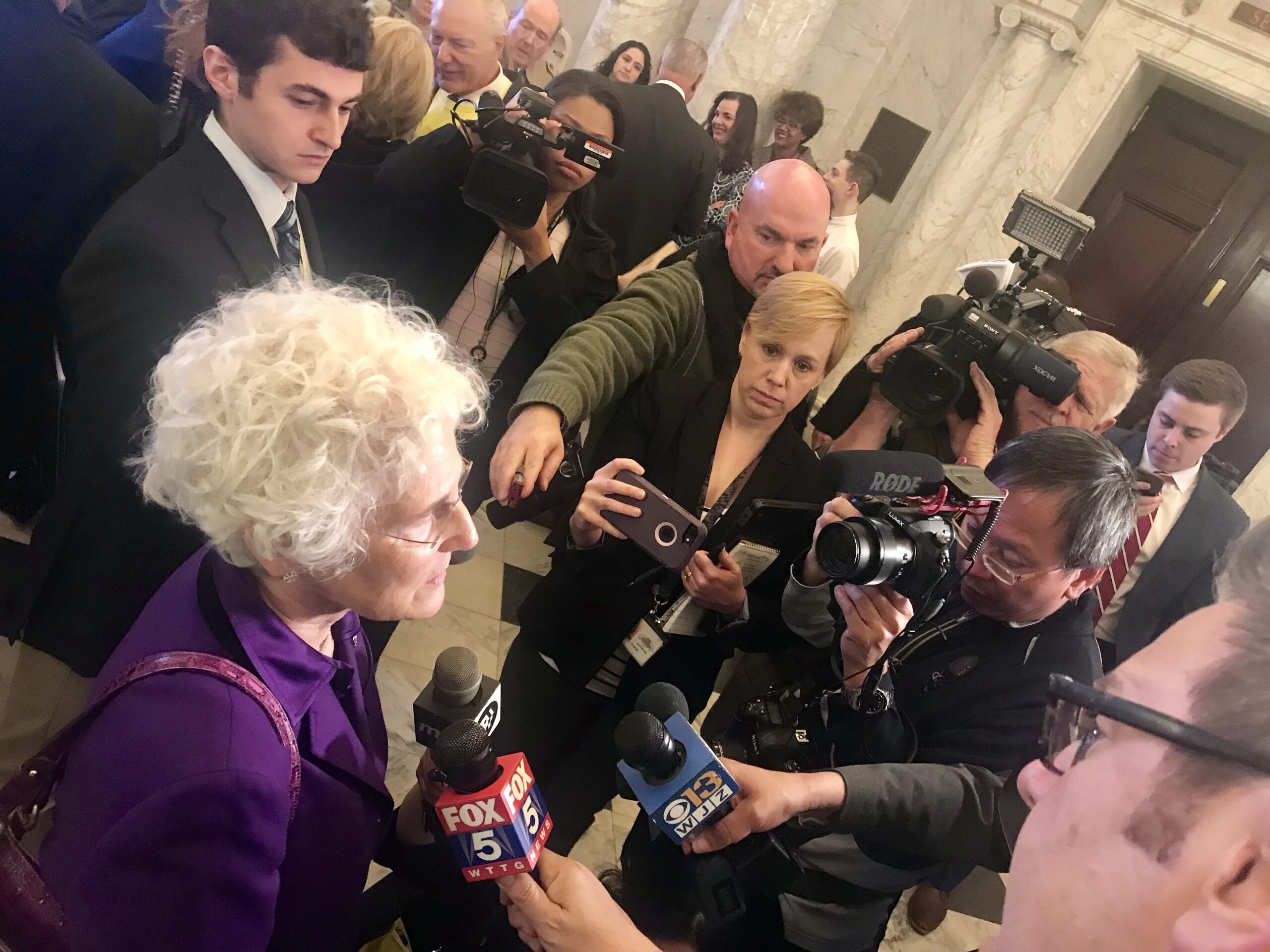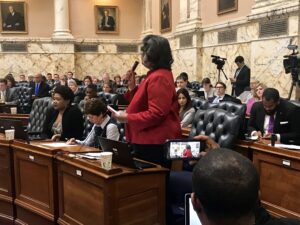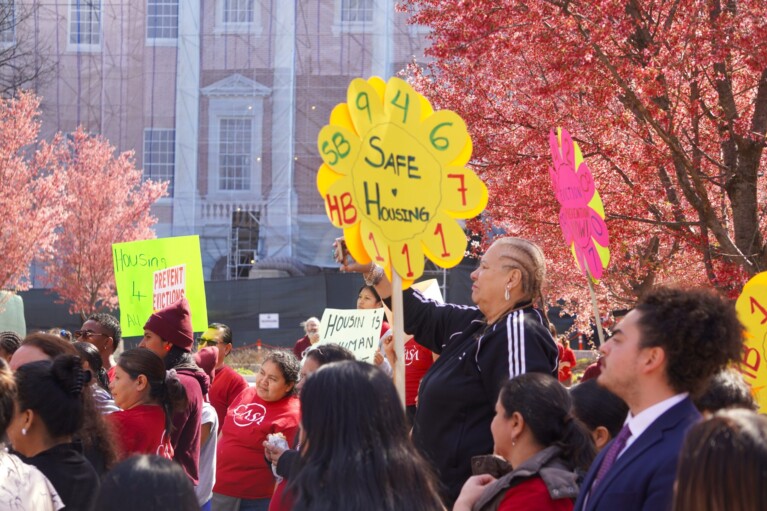
Members of the Maryland House of Delegates sobbed, and stared up at the Tiffany glass ceiling, and buried their heads on their desks Thursday morning as colleagues shared deeply emotional stories about the ends of the lives of loved ones during an hour-long debate over whether to allow physician-assisted suicide in the state.
It is the first time such a bill has reached the floor of the Legislature, and the measure passed the House by a vote of 74-66, dividing party and caucus lines.
During the debate, Del. Geraldine Valentino-Smith (D-Prince George’s), a nurse and lawyer who worked at the National Institutes of Health, referred to the bill sponsor Del. Shane M. Pendergrass (D-Howard) and floor leader Del. Joseline Peña-Melnyk (D-Prince George’s and Anne Arundel) as her “sheroes,” but said she couldn’t support them on this bill.
“There is no doubt the vulnerable, elderly, and disabled will get the clear message we’re sending: that dying is a solution like any other. And perhaps preferable to straining the family or society of financial resources,” Valentino-Smith said. “In years to come, this option will not be perceived as a dignity, it will be perceived as duty, a duty to die and save resources and save others from having to take care of us.”
But Del. Terri Hill (D-Baltimore and Howard), a Catholic and a physician, said the bill does not impose any societal, religious or governmental beliefs on anyone.
“It allays guilt and removes shame and adds a degree of certainty to an option that they already have,” Hill said. “To me, when you can allay shame and guilt for someone who is acting in a way that relates to their own life and no one else’s, and their belief in God and their personal relationship with God, that’s compassion.”
Lawmakers also shared stories of how they decided, in the final moments with some of their loved ones, how they would vote on the bill, which has failed to reach the House floor the last three sessions it was introduced.
Del. Carl Anderton Jr. (R-Lower Shore) said he was voting against the bill to keep his promise to his brother-in-law, who died of glioblastoma in the first year the bill was introduced.
“In our conversations at the end, he said that he would give anything to have just one more day, that he would never want to cut himself short,” Anderton said.
Del. Cheryl Glenn (D-Baltimore City) said given the opportunity, people in times of intense emotion and suffering could make a bad decision to end their own lives. She talked about her sister, who dying in extreme pain, wished there was a way to end her life earlier. If she had, Glenn’s sister would have missed an end-of-life reconciliation with her only son. Witnessing that moment three years ago, Glenn immediately thought of this bill and knew she must oppose it.

Del. Cheryl Glenn (D-Baltimore City) speaks against the End-of-Life Option Act on the House floor Thursday. Photo by Danielle E. Gaines
“It is hard to see your loved one suffer. It’s really hard, but should we ever put them in a situation to end their lives? I don’t think so,” she said.
Del. Eric Luedtke (D-Montgomery), in emotional remarks, talked about his family history of suicide and the deep moral questions the bill raises.
“I despise suicide,” Luedtke said, pointing to an anti-suicide tattoo.
But he also cared for his mother in her dying days, when she endured extraordinary pain.
“Despite my personal hatred for suicide, I began to ask myself what right I had as a government official, even as her son, to dictate to her how her life should end,” Luedtke said. “What right do any of us have to determine that for another individual?”
He voted in favor of the bill, as did the entire Montgomery County delegation. Twenty-five Democrats voted against the bill, and one Republican, Del. Trent L. Kittleman (R-Carroll and Howard) voted in favor.
The Legislative Black Caucus, the largest voting bloc in the House of Delegates aside from the Democratic Party, was split on the issue, voting 27-17 in favor.
Del. Jay Walker (D-Prince George’s) said the House was “overstepping our bounds.” A retired professional football player, he talked about a former teammate who had ALS and who, at the very end of life, was able to use technology to communicate with his eyes.
Walker said his friend wanted to stay around and fight every day, to hear stories of what his friends and family were up to. Those conversations made him decide to vote against the bill.
“I’m always going to give my Lord the opportunity at the miracle,” Walker said.
Sen. William C. Smith Jr. (D-Montgomery), the Senate sponsor of the bill, snuck across the State House lobby to witness the end of the debate and vote.
“It’s historic. It’s the first time it’s advanced so far,” Smith said. “It gives us a lot of momentum in the Senate.”
Smith, who is vice chair of the Senate Judicial Proceedings Committee considering the bill, said the panel is likely to discuss a vote on the bill early next week.
Chairman Robert A. Zirkin (D-Baltimore County) said he plans to support some version of the bill, but conceded that he’s worried about the details.
“You want to make sure it’s tight enough to apply to pain and suffering and not get abused,” Zirkin said.
Asked if it’s going to pass his committee, Zirkin said, “I haven’t polled anybody yet.”
A majority of the committee’s members have signed on as cosponsors of this year’s bill.
Josh Kurtz contributed to this report.




 Creative Commons Attribution
Creative Commons Attribution